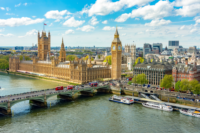
Dog whistles and panic about immigration
Nigel Farage can congratulate himself. His party did well in recent local elections; but so did the Liberal Democrats and Reform’s support may not last. What he can be especially pleased about is to have reduced the leaders of the Conservative and Labour parties to quivering jelly: terrified that their supporters will abandon them unless they are fed a diet of dog-whistle slogans and impractical but draconian-sounding immigration policies.
The Conservatives’ odd Soviet era obsession with planning targets for net immigration comfortably meets Einstein’s definition of insanity: doing the same thing over and over again and expecting different results. They somehow fail to have noticed that the statistics on net migration are largely meaningless: massively inflated by overseas students who are wrongly counted as immigrants.
The Labour government’s proposals by contrast have some perfectly sensible bits. Who would seriously quarrel with the idea that policy should aim to maximise the contribution immigrants make to the UK? Or with the idea that employers should cease regarding immigrants as an excuse for not training their British labour force. There are no numerical targets: good. But why spoil it with demagogic dog-whistles about ‘an island of strangers’ or Brexit bromides about ‘taking back control’ or – worst - denouncing liberal immigration as ‘squalid’.
The political debate would benefit from more reflection on the history of immigration politics, survey data on public attitudes and rigorous research on the impacts of immigration. I have tried to pull together this material in a working paper for ODI Global.
Immigration panics are not new. At the turn of the 20th century, the populist Tory MP, William Evans-Gordon, led a movement to stop Jewish immigration from- mainly- Russia. Crime, disease, stealing jobs: the usual. The Balfour government was panicked into the 1905 Aliens Act whose institutionalised antisemitism so disgusted Winston Churchill that he left the Tories for the Liberals.
In 1968 another populist anti-immigration Tory MP, Enoch Powell, made apocalyptic warnings about ‘coloured’ immigration. Public anxiety panicked the Labour government shortly afterwards into stripping Asian refugees from Kenya of their British citizenship (including my late wife’s relatives). With hindsight, Powell was uncannily accurate in his demographic predictions (currently over 8 million self-identify as ‘non-white’, around 12.5% of the population.). But he was wildly inaccurate in his predictions of the consequences. The Thames and other British rivers are not foaming with blood. (as opposed to sewage).
IPSOS and British Election Study survey data on public attitudes suggests that public opinion on the issue is volatile. It also suggests that the public consistently overestimates the scale of the immigrant (and ‘non-white’) population by a factor of over two. One paradox however is that the proportion of the public who think ‘there is too much immigration’ has fallen steadily as immigration numbers have risen. Another consistent trend is a rise in the proportion who think that immigration has been good for the country: economically and through diversity. Only 5% would object to having an immigrant family next door.
Younger people are generally more tolerant than the old as are those who are more directly exposed to immigrant communities. And there is a good story about the steady residential desegregation of immigrant communities and social mobility through education especially for those of Bangladeshi, African, Indian and Chinese heritage (less so for Caribbean and Pakistani backgrounds).
But host community attitudes are contradictory. Many people feel broadly positive about immigration but want less. Large majorities support refugee protection but strongly object to admitting ‘illegal’ refugees who have risked their lives in small boats to get here. Most would prefer to have well paid British workers picking fruit or providing social care but would object to higher fruit prices or higher council tax to better remunerate care workers. Such confusion leads to populist politics and bad policy.

Economic research gives a little more clarity. Immigration boosts growth but growth per head (that is, living standards) only slightly. Immigrants contribute overall more in tax than they take out in public services and benefits but not unskilled migrants. Immigrant workers do not in general impact on British wages and jobs since their jobs are complementary rather than competitive. The biggest impact of large net immigration is on the housing market: good for homeowners; not for renters and buyers.
The Labour government has clearly signalled that an era of relatively liberal immigration is ending. Like other Western democracies we are turning inward. That is a legitimate democratic choice. But there are consequences, and the government has a duty to spell them out.
Applying ‘cold turkey’ to low-skilled immigration is a body blow to the care sector. British families will have to start looking after their own incontinent and demented grannies and grandads; not leave them in care homes. They will have to get used to more self-service and longer queuing in the hospitality sector. They will have to get used to shortages of people who do the dirty jobs ensuring regular bin collection., sweeping up litter and cleaning public loos. And Buy British food will cost more. Many firms which rely on immigrant workers will go out of business.
As for universities unable to recruit overseas students paying high fees, they should expect deeper cuts in staff and departments. British students will have to pay much higher fees or lower their expectations of tertiary education. Universities in unfashionable ‘left-behind’ places may disappear.
As for the ’illegal’ ‘boat people’, a very visible but small addition to the numbers, we may need get used to paying the French more to help reduce trafficking. And accept that, nonetheless, more refugees will drown by being forced into riskier routes. Or perhaps they will be sent them back to a vengeful Taliban or the Iranian mullahs. Stronger stomachs will be needed.
The government should not be so naïve as to expect Nigel’s merry men to say ‘well done and thank you’. They will be vindicated and move on, strengthened, to a new set of grievances.

Sir Vince Cable is a former Secretary of State for Business, and led the Liberal Democrats from 2017-19.












